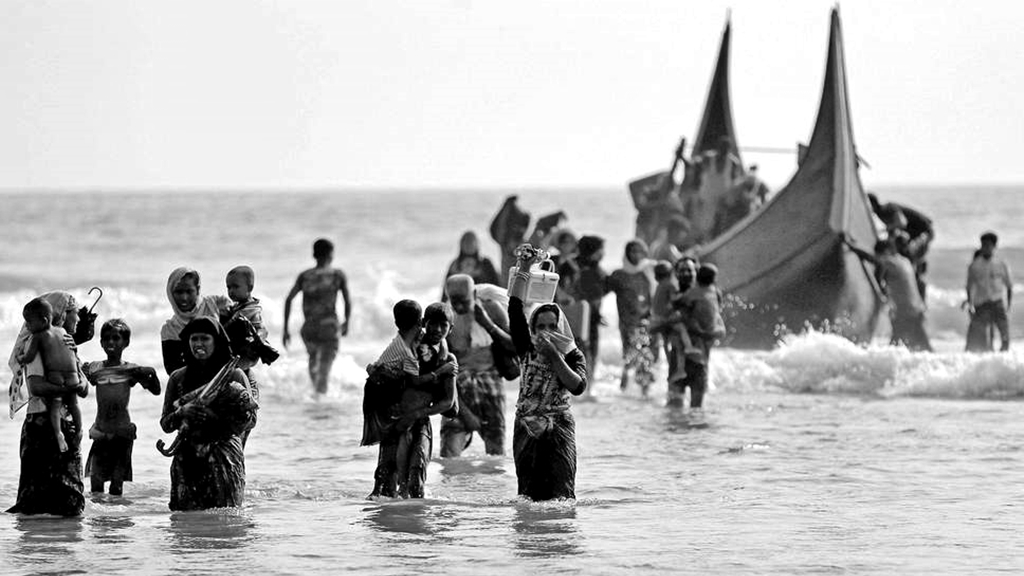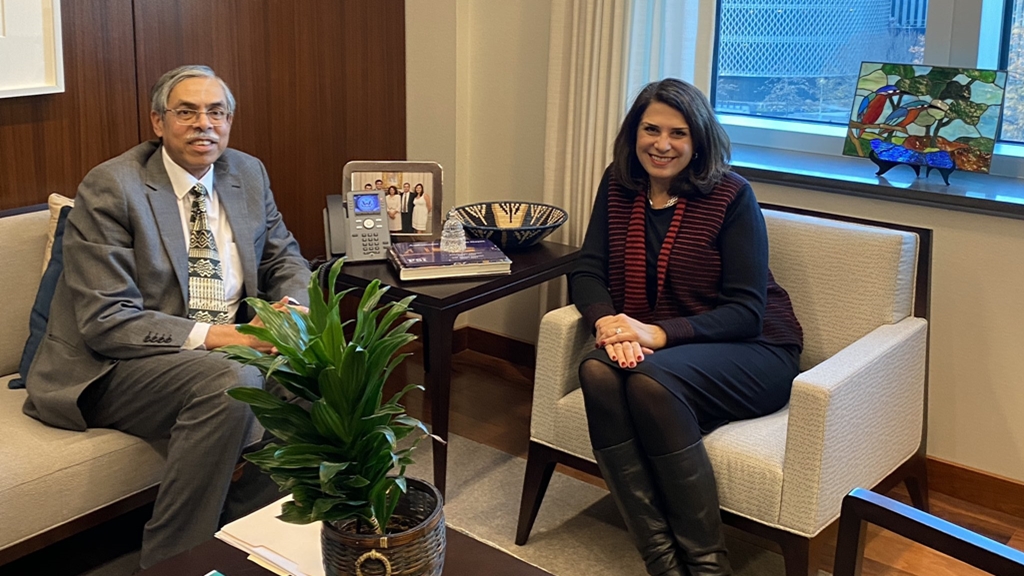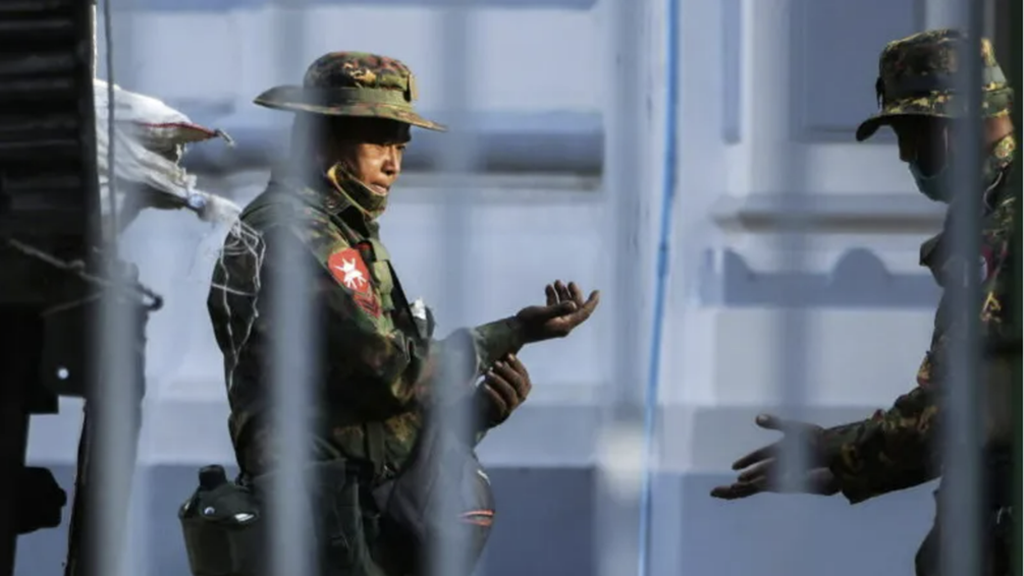
These Rohingyas are not migrants, they are refugees
- 19/05/2015
- 0
By Aman Ullah
“A refugee is a person who owing to a well-founded fear of being persecuted for reasons of race, religion, nationality, membership of a particular social group or political opinion, is outside the country of his/her nationality and is unable, or owing to such fear, is unwilling to avail himself/herself of the protection of that country.”1951 Geneva Convention
In the last week, there have been heart-breaking scenes of emaciated men, women and children reaching up to catch bottles of water thrown by journalists who had found them in the open seas off Indonesia, Thailand and Malaysia.
These people are fleeing in makeshift vessels on rough seas towards countries such as Malaysia and Thailand in Asia. Braving daunting conditions, some were fortunate to land on shores, but many perished along the way, their boats capsizing or forcibly sunk. Those successful to have landed on ground have been threatened with deportation or worse — a life in a refugee camp.
Just who are these desperate people, so fraught with terror that they would risk their lives, their loved ones and all their worldly possessions and set off on such a perilous journey? They happen to be the Rohingya people of Burma, legitimate citizens of the country and who have been rejected by their own Buddhist countrymen.
UN secretary-general Ban Ki-moon has expressed support for Thailand’s plan to hold a regional meeting in Bangkok on May 29 to address the Rohingya migration problem. During a telephone conversation with Prime Minister Prayut Chan-o-chan, Mr Ban praised the meeting as a significant initiative to seek international cooperation to solve the growing crisis, a member of the government spokesman’s team, Maj Gen Weerachon Sukhontapatipak, said.
Mr Ban said Rohingya migrants should be accorded the human dignity and basic rights they deserve.
Senior officials from 15 countries including Indonesia, Malaysia, Bangladesh, Australia, the United States, as well as international organisations, are likely to attend the one-day meeting. Myanmar has suggested it may not attend.
Mr Ban clearly mentioned the term ‘Rohingya migration’ or ‘Rohingya migrants’. Most of the International media, in their recent reports, also mentioned as Rohingya migrants. Now the question is, is it true that thousands of members of the Rohingya who are now adrift in the Andaman Sea, are really migrants? Or they are refugees?
What is migrant means?
A migrant is a person who makes a conscious choice to move to a country. They are able to read about the country and learn about it from friends and families. They have time to study the language and explore employment opportunities before they make a final decision about whether to come. They can plan their travel, take their belongings with them and say goodbye to the important people in their lives. They are free to return home at any time if things don’t work out as they had hoped, if they get homesick or if they wish to visit family members and friends left behind.
Migrants, especially economic migrants, choose to move in order to improve the future prospects of themselves and their families.
Then what is refugee means?
A refugee is a person who has had to flee his or her country of origin because of persecution or a well-founded fear of persecution on account of race, religion, nationality, membership in a particular social group, or political opinion.
Refugees are forced to leave their country because they are at risk of, or have experienced persecution. The concerns of refugees are human rights and safety, not economic advantage.They leave behind their homes, most or all of their belongings, family members and friends. Some are forced to flee with no warning and many have experienced significant trauma or been tortured or otherwise ill-treated. The journey to safety is fraught with hazard and many refugees risk their lives in search of protection. They cannot return unless the situation that forced them to leave improves.
Although the concept of taking refuge in another region has been long known and understood, the term “refugee” was completely defined after the 1951 Geneva Convention. Now the term refugee is a well-defined term and distinct from an internally or nationally displaced persons.
The 1951 Convention relating to the Status of Refugees (and its 1967 Protocol) defines a refugee as: “Any person who owing to a well founded fear of being persecuted for reasons of race, religion, nationality, membership of a particular social group or political opinion, is outside the country of his/her nationality and is unable, or owing to such fear, is unwilling to avail himself/herself of the protection of that country.”
Because refugees have to escape persecution, they differ from migrants. A migrant is a person who decides to live in another country by his/her own choice based on a variety of grounds, such as economical reasons. In the case of return, migrants benefit from the protection of their country of nationality. Refugees, in contrast, cannot return to their homelands, as they fled from persecution. Migrants, therefore, are not protected by refugee law but through international human rights law.
They are not migrants, they are refugees
In this particular sense, these Rohingyas are not migrants they are completely refugees. The Rohingya are a Muslim ethnic group of Burma/ Myanmar The Rohingyas have been termed by a United Nations report as the most persecuted religious community in the world.
The Rohingyas have been expelled or had to flee from their country, Burma, since 1942 as a result of “widespread or systematic’ persecution. Not a single of the Articles enshrined in the Universal Declaration of Human Rights is honored by the Buddhist government in its treatment of the Rohingya people. The Burmese government had effectively made them stateless in their own country with no rights and made them the most persecuted people on earth. As a result of such unfathomable violations of human rights, a majority of the Rohingya have ended up living as refugees or unwanted people in many parts of our world, especially, Saudi Arabia, Pakistan, Bangladesh and the Gulf States.
The repression of the Rohingyas has gradually intensified since the relaxation of international embargo on President Thein Sein’s government in 2011. In June and October 2012 there were large scale ethnic cleansing drives on Rohingyas in Rakhine State to exterminate or drive them out of the country. Hundreds of thousands lost their homes, which were destroyed by the marauding and genocidal Buddhists with support from the local and central government and the racist politicians and monks. Some 140,000 of them are now forced to live in concentration camps. To make things worse for the persecuted Rohingya, the government in March revoked white cards – or “temporary registration certificates” – that had been issued to hundreds of thousands of Rohingyas. This meant that they no longer have the right to vote in upcoming elections in November.
In the past three years, more than 120,000 Rohingyas have boarded ships to flee abroad, according to the UN refugee agency. It published a report in May saying that 25,000 migrants had left Myanmar and Bangladesh in the first quarter of this year, about double the number over the same period last year. Between 40-60% of the 25,000 are thought to originate from Myanmar’s western State of Rakhine.
The oppression they suffer there is so severe “that they feel they have no option but to leave”, said Chris Lewa of Arakan Project.
According to Professor Penny Green of the International State Crime Initiative (ISCI), based at Queen Mary University of London, the current crisis is the direct result of government sponsored actions against the Rohingya, which together amount to genocide.
“The Myanmar government’s ongoing persecution of the Rohingya minority has, in the last two years, reached a level so untenable that tens of thousands have been forced to flee on boats. The current exodus of those seeking asylum is just one manifestation of persecution consistent with genocide,” said Professor Green.
According to Professor Green, there is a general reluctance to define an event as genocide until after mass killing begins. “Our research is being conducted within a state crime framework in which genocide is understood as a process, building over a period of years, and involving an escalation in the dehumanization and persecution of the target group. The Rohingya have been subject to stigmatization, harassment, isolation, and systematic weakening. The Rohingya are faced with only two options: stay and face annihilation, or flee. Those who remain suffer destitution; malnutrition and starvation; severe physical and mental illness; restrictions on movement, education, marriage, childbirth, livelihood, land ownership; and the ever present threat of violence and corruption,” said Professor Green.
In utter desperation, the Rohingya have become the stranded boat people of our time. Aptly put, they are forced to brave death at sea to escape ‘open-air concentration camps’ in genocidal Burma.
Humans are not born as refugees, but rather become refugees by necessity. Fleeing from persecution, violence and fearing for their lives, refugees are some of the most vulnerable people in the world. Like other refugees, Rohingya refugees also lost their safety net. They have no protection from their own state – indeed it is often their own government that is threatening to persecute them.
Thus it is now responsibility of regional and international community to ensure their fundamental rights and safety under the international framework and refugee protection norms. If other countries do not let them in, and do not protect and help them once they are in, then they may be condemning them to an intolerable situation where their basic rights, security and, in some cases their lives, are in danger.
According to Klang MP Charles Santiago, Malaysia’s role in the UNSC compels it to uphold the Responsibility to Protect (RtoP) through Resolution 1674 (Para 139), which means the country must accept all Rohingya refugees, regardless whether they are facing death at sea.
“This is mandatory under the international law of non-refoulement,” Santiago said in a statement there. “This law dictates that no country should return refugees to places where they are persecuted or subjected to danger,” he added.
Malaysia may not recognize refugees, but as a member of the United Nations Security Council (UNSC), it is required by international law to rescue the thousands of Rohingya refugees currently stranded at sea, a DAP lawmaker said.
“Asean (the Association of Southeast Asian Nations) can no longer hang on to the belief of non-interference, not when there is a clear and present danger to humanity.
Santiago claimed the Malaysian government has “craftily” avoided adhering to international maritime law that says the country is legally required to rescue people in distress at sea, by translating “distress” to mean “sinking boats and drowning people”.







